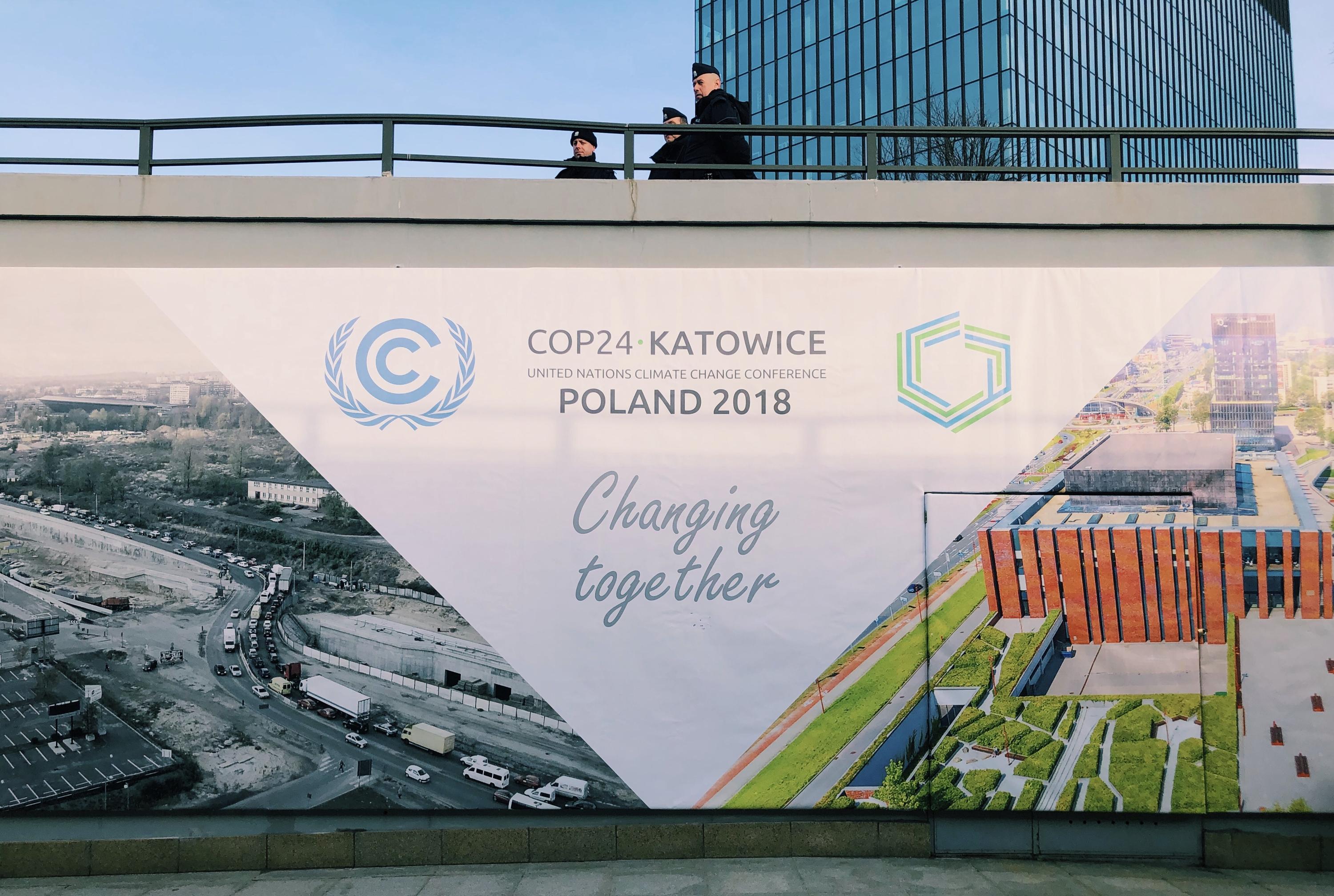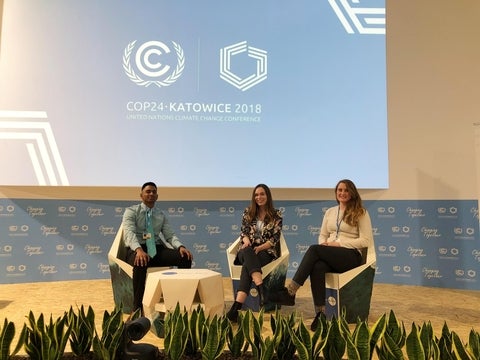
In December 2018, the Waterloo Climate Institute and the Univeristy of Waterloo sent six students to the 24th Session of the Conference of the Parties (“COP24”) to the United Nations Framework Convention on Climate Change (UNFCCC).
COP24 was held in Katowice, Poland, bringing together international leaders to discuss climate change and the next steps in implementing the Paris Agreement. Two of the COP24 delegates, Korey McKay and Blaine Lyons, are students in the Master of Climate Change program at the University of Waterloo. These students shared their reflections on the experience at COP24.
Changing Together
Reflections by Korey McKay and Blaine Lyons For those studying climate change, the Conference of the Parties to the United Nations Framework Convention on Climate Change (UNFCCC) is the biggest international event of the year. Being able to attend in person allowed us as Master of Climate Change students to gain valuable insight into how the future of the planet is negotiated.
The IPCC recently released a report on the dangers of surpassing a 1.5 degrees Celsius increase in global temperatures, compared to pre-industrial levels, by 2030. At the 24th Conference of the Parties (COP24) in Katowice, Poland, it was stressed that five times more ambition is needed to avoid devastating consequences. The main goal of COP24 was to develop a Rulebook that outlines the tools and processes to enable effective and fair implementation of the Paris Agreement. The opening ceremonies emphasized that without success in Katowice, the Paris Agreement would not be successful and the planet will be in danger.
As delegates from the University of Waterloo, we were able to observe the progression of negotiations over the course of Dec 3-9, 2018. Katowice is an industrial city located near the Upper Silesian Coal Basin with strong roots in mining. Katowice prides itself in being a story of transition from “black to green” through adapting to technological and societal change. However, during our stay we witnessed festivities for Coal Miner’s Day, demonstrating how deeply rooted mining is in the region’s social and cultural identity. Just transition of the workforce from the fossil fuel industry to a low-carbon economy was thus a major feature of COP24. In addition to just transition, the concept of solidarity and “changing together” was echoed throughout the conference. Participating parties adopted the Solidarity and Just Transition Silesia Declaration as a result.
During our time at the COP24 we were uniquely positioned to engage in panels and side-events leading up to the Declaration. Climate measures of resilience, transparency, accountability, and more, involve complex processes of negotiation. Doing so in a just manner, we learned, is even more complex. Our coursework in the MCC program allowed us to engage in in-depth conversations on the many systems shaping the outcome of these negotiations.

Left to right: Ashoke Mohanraj (SERS), Korey McKay (MCC), and Blaine Lyons (MCC).
There was wide acknowledgement that governments are not alone in needing to enhance their ambition for climate action. A strong focus was placed on what individuals, businesses and communities can do to tackle climate change. The United Nations launched the Act Now Bot which recommends everyday actions, such as taking public transportation and eating less meat, to individuals through social media. Businesses shared their stories on how they reached net zero emissions while flourishing. Communities spoke about citizen-led initiatives that have brought positive change. These motivating stories of how taking climate action can save money and make us healthier while strengthening the economy spread a feeling of positivity throughout the conference.
However, it was also evident that more deliverable action is urgently needed. As one panelist put it, “the climate is changing faster than us.” While urgency was reiterated by conference attendees (such as pins, stickers and posters with “I am generation 2030” distributed throughout the venue), a general lack of action was a major frustration for many of the experts and speakers at the conference. Although a Rulebook was landed by the end of the conference, certain issues such as market mechanisms were not worked out. Any decision that becomes pushed back feels like defeat, since we do not have time for limitless negotiations.
With a pressing deadline of 2030, we have just over a decade to see our emissions reduced by half. Activists like 15-year-old Greta Thunberg will play a major role in effecting change as the window for action continues to narrow. COP24 made clear that we can all have a similar impact behind the scenes. Everyone is able to participate in a transition to a low-carbon economy that is just and equitable, because climate change does not discriminate; we are all #generation2030.